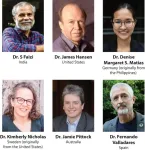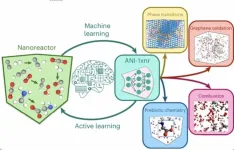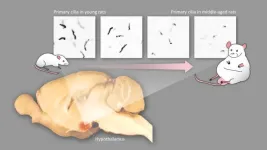“We could not be more grateful to our corporate partners for their support of these awards. It is an exciting time in genomic medicine and to see these promising clinician scientists recognized is inspiring and promising for our field,” said Nancy Mendelsohn, MD, FACMG, president of the ACMG Foundation.
Clinical Biochemical Genetics Laboratory Fellowship Award:
Xueyang Pan, PhD, Baylor College of Medicine
Upon receiving the ACMG Foundation Next Generation Award, Dr. Pan said, “I am sincerely grateful and deeply honored to have been selected as the recipient of the Next Generation Fellowship Award. This award provides me with a perfect start in my career in clinical laboratory genetics.”
Dr. Xueyang Pan obtained his bachelor's degree in medicine in Peking University Health Science Center in Beijing, China and PhD degree in genetics in the University of Minnesota. Dr. Pan has thirteen years of research experience in human genetics, molecular genetics and pharmacology, during which he published 23 peer-reviewed research articles. In the past four years, Dr. Pan has served as a postdoctoral associate with the Baylor College of Medicine, focusing on the diagnosis of rare genetic disorders and the linkage between sphingolipid dysmetabolism and neurodegenerative diseases. Dr. Pan also volunteered as a variant biocurator in two ClinGen Variant Curation Expert Panels.
Bianca Seminotti, MSc, PhD, University of Pittsburgh School of Medicine and UPMC Children's Hospital of Pittsburgh
“I am thrilled and deeply honored to receive the Next Generation Award as a Clinical Biochemical Genetics trainee. This is a significant milestone in my professional and personal journey. I would like to thank the ACMG foundation for this wonderful opportunity. My sincere gratitude to Dr. Jerry Vockley for the constant support and encouragement, as well as to mentors and colleagues throughout my career. I am looking forward to starting this fellowship and expanding my knowledge about inherited metabolic diseases, getting actively involved in the clinical genetics community and contributing to improve the quality of life of patients and their families,” Dr. Seminotti said.
Dr. Bianca Seminotti has a BSc in Biomedicine (2008), an MSc (2011) and a PhD (2014) degrees in Biochemistry from the Federal University of Rio Grande do Sul (UFRGS), Porto Alegre, Brazil. During her time as graduate student, her research focused on studying inherited metabolic disorders using animal models for aminoacidopathies and organic acidurias. After earning her PhD, she continued to develop research projects focusing on metabolic disorders at the same University as a Junior Postdoctoral Fellow (2014-2015). She also worked as a Postdoctoral Fellow at the Department of Pediatrics, University of Pittsburgh Medical Center (UPMC) Children's Hospital of Pittsburgh, USA (2015-2017). She now has excellent experience in the general subjects of Biochemistry, Genetics, Neuroscience and Molecular Biology, with emphasis on pathomechanisms of inherited metabolic disorders. Dr. Seminotti developed her teaching skills during her temporary appointment as a Professor of Biochemistry at the Federal University of Santa Catarina (2012-2013, Brazil) and at the Federal University of Health Sciences of Porto Alegre (2021-2022, Brazil). Dr. Seminotti currently works as a Research Scientist at the Department of Pediatrics, UPMC Children's Hospital of Pittsburgh, developing translational science projects to evaluate promising novel therapies for fatty acid oxidation and branched-chain amino acid metabolic disorders and mitochondrial complex I deficiencies.
Laboratory Genetics and Genomics Fellowship Award:
Adriel Yejin Kim, MS, Nationwide Children's Hospital
“As an incoming Laboratory Genetics and Genomics fellow at The Steve and Cindy Rasmussen Institute for Genomic Medicine at Nationwide Children’s Hospital, I am extremely honored to receive this prestigious award. It has been my long dream to serve in the clinical genetics community with a leading role. My goal is to tackle the unique set of challenges clinical genetics faces, establish timely and reliable testing, and forward the field by promoting a collaborative environment with both research and clinical professionals. I greatly thank the ACMGF selection committee for the award, my current doctoral mentor, Dr. Charis Eng, who provided me with the structure and guidance that I needed to become an autonomous thinker and scientist, and lastly but not least, my LGG program directors, Dr. Catherine Cottrell and Dr. Marco Leung, who understood my passion for clinical genetics and have already shown so much support and trust in me,” said Ms. Kim.
Adriel Y. Kim is currently completing her PhD in the Molecular Medicine program at the Lerner Research Institute of Cleveland Clinic and Case Western Reserve University in Cleveland, Ohio. She is pursuing her degree under the mentorship of Dr. Charis Eng to discover genomic modifiers in PTEN hamartoma tumor syndrome (PHTS), a rare genetic disorder associated with cancer predisposition and autism spectrum disorder (ASD). The motivation of Adriel’s research is to develop prediction models for ASD and cancer outcomes in PTHS by furthering knowledge of gene-disease relationships. Adriel holds a BS in Molecular and Cellular Biology from the University of Illinois at Urbana-Champaign and an MS in Diagnostic Genetics from the University of Texas MD Anderson Cancer Center. She has significant experience in clinical laboratories, working as a certified technologist for many years, most extensively in cancer cytogenetics. Supported by her years of clinical and translationally focused research experiences, Adriel plans to integrate her unique background into fellowship training and to eventually serve as a bridging force between translational research and medical genomics.
Maged Zeineldin, MBBCh, MSc, PGD-IT, PhD, Johns Hopkins University School of Medicine
“Dr. Doheny reached out to me with the incredible news that I had been chosen to receive the LGG fellowship award. This was one of the greatest moments in my life. My initial motivation for pursuing a PhD was to get a deeper understanding of the molecular basis of genetics. Throughout my academic journey, my overarching objective remained anchored in returning to clinical practice and making a positive impact on my patients' lives. The culmination of my PhD studies and postdoctoral training has equipped me with the skills and knowledge necessary to achieve this long-standing goal. The last decade has witnessed a revolutionary transformation in diagnostic tools, offering enhanced options for patient care. Securing this remarkable opportunity at the prestigious Johns Hopkins University School of Medicine has been a source of immense joy, reaffirming that I am on the path to realizing my dreams,” said Dr. Maged Zeineldin.
Dr. Maged Zeineldin began his medical education at the Faculty of Medicine, Alexandria University, Egypt, where he pursued clinical and laboratory genetics following his medical
internship. During this phase, he played a pivotal role in establishing Alexandria's first molecular genetics laboratory. Subsequently, Dr. Zeineldin earned a master's degree in human genetics, focusing on the molecular diagnosis of Fragile-X syndrome carriers. His research extended to exploring the impact of genetic polymorphisms on prevalent conditions such as preeclampsia and diabetes mellitus. He also obtained a postgraduate diploma in information technology with a specialization in bioinformatics from Alexandria University. Then he received a 3-years scholarship from Ford Foundation to pursue his PhD studies at the University of Kansas, in Kristi Neufeld's laboratory. During his doctoral research, he studied the tumor suppressor gene APC in colon cancer and Familial Adenomatous Polyposis (FAP). After finishing his PhD, he joined Dr. Mike Dyer's group at St. Jude Children's Research Hospital, focusing on the role of Alpha Thalassemia Retardation X-linked (ATRX) gene mutations in neuroblastoma, utilizing next-generation sequencing (NGS). This theme persisted as he transitioned to the T. Larman Lab at Johns Hopkins University School of Medicine, where his current research explores how the epigenome, metabolome, and microenvironment collectively influence genetic mutations during neoplastic transformation. He has published 16 papers and have 3 one currently in revision.
Medical Biochemical Genetics Subspecialty Fellowship Award:
Kaitlin Weisshappel, MD, University of Colorado
“I am incredibly grateful and humbled to be selected as the Next Generation Medical Biochemical Award recipient. With this additional support, I plan to continue striving towards equity in indigenous healthcare, both through direct care and through better understanding and approaches towards newborn screening and metabolic care. To detect an underlying metabolic condition, is to potentially intervene and preserve a life. To me it is a way to not only protect my people, but also our culture,” said Dr. Kaitlin Weisshappel.
Dr. Weisshappel grew up in Northern Wisconsin and received her medical care within the Indian Health Services. Her initial interest in medicine developed from adversities witnessed within her tribal community and family. However, her path into genetics was guided by her nephew, who was postnatally diagnosed with Trisomy 21, while she was a senior in high school. She would then go on to obtain her bachelor’s degree in Genetics, with minor in Public Heath from the University of Wisconsin-Madison, and then enter medical school as the inaugural student of the Native American Pathways Program at the University of Illinois. Dr. Weisshappel is not foreign to trailblazing, as she would then be the first combined Pediatrics/ Medical Genetics resident at Emory University. Her initial research endeavors were community based within tribal communities, ranging from providing educational cancer programming and tribal needs assessments, to now delving into Newborn Screening efforts. After the completion of her residency training at Emory University, she will continue training at the University of Colorado Medical Biochemical Genetics Fellowship program. Her fellowship will be funded by the Next Generation Fellowship and Training Award from the ACMG Foundation.
Ophthalmic Genetics Fellowship Award:
Ahmad Al-Moujahed, MD, PhD, MPH, Massachusetts Eye and Ear
“I am thrilled and honored to receive the Next Generation Ophthalmic Genetics Award,” said Dr. Al-Moujahed. “I would like to thank the ACMG Foundation for Genetic and Genomic Medicine for supporting the training of future specialists in Ophthalmic Genetics. I am confident that my upcoming fellowship in Inherited Retinal Degenerations (IRDs) at Massachusetts Eye and Ear, Harvard Medical School, along with my prior training, will provide me with the knowledge and skills to become a clinician-scientist in the field of IRDs.”
Dr. Al-Moujahed was born and raised in Damascus, Syria. He earned his MD at Damascus University Faculty of Medicine in Syria before moving to the United States in 2011. Dr. Al-Moujahed started his journey in the United States as a Research Fellow in the Angiogenesis Lab at Mass. Eye and Ear under the supervision of Dr. Demetrios Vavvas. During his research fellowship at MEE, he decided to expand his training as a scientist, so he applied to the PhD Program in Biomedical Sciences at Boston University School of Medicine. He performed his PhD research in Dr. Vavvas’ lab and he earned his PhD in Experimental Pathology from BU in 2018. During his time in Boston, he also earned a Master of Public Health (MPH) from Northeastern University. He is currently a second-year vitreoretinal surgery fellow at Massachusetts Eye and Ear, Harvard Medical School. He has published 51 peer-reviewed articles and 2 book chapters. In addition, he is involved in humanitarian work. He has been a member of several NGOs that aim to alleviate the suffering of Syrian people in Syria and its neighboring countries due to the war there. He has organized multiple online courses for Syrian medical students and healthcare professionals in Syria. His latest humanitarian project has been designing and leading a vision screening program for 5,000 Syrian children in the refugee camps in Lebanon.
Kirill Zaslavsky, MD, PhD, Massachusetts Eye and Ear
Upon receiving the honor, Dr. Zalavsky said, “It is a huge privilege to receive the award and incredibly motivating to know that your work is valued by experts in your field.”
Dr. Zalavsky obtained his H. BSc. in neuroscience at the University of Toronto, completing his undergraduate thesis under Dr. Paul Frankland investigating adult neurogenesis and memory formation. Next, he entered the combined MD/PhD program at the University of Toronto. During his PhD under Dr. James Ellis in the Department of Molecular Genetics, he used human induced pluripotent stem cells to define the role of autism-associated gene SHANK2 on neuronal development, collaborating with Dr. Michael Salter and Dr. Stephen Scherer’s groups. During ophthalmology residency, he continued a deep involvement with research, obtaining grants from Fighting Blindness Canada and other sources for investigation of birdshot chorioretinopathy, an autoimmune eye disease with genetic susceptibility. Following residency, Kirill will pursue a fellowship in Inherited Retinal Degenerations at Massachusetts Eye and Ear Infirmary. Afterwards, he plans to complete a fellowship in vitreoretinal surgery, and hopes to contribute to the growing field of retinal gene and stem cell regenerative therapy.
About the ACMG Foundation for Genetic and Genomic Medicine
The ACMG Foundation for Genetic and Genomic Medicine, a 501(c)(3) nonprofit organization, is a community of supporters and contributors who understand the importance of medical genetics and genomics in healthcare. Established in 1992, the ACMG Foundation supports the American College of Medical Genetics and Genomics (ACMG) mission to “translate genes into health.” Through its work, the ACMG Foundation fosters charitable giving, promotes training opportunities to attract future medical geneticists and genetic counselors to the field, shares information about medical genetics and genomics, and sponsors important research. To learn more and support the ACMG Foundation mission to create “Better Health through Genetics” visit www.acmgfoundation.org.
Note to editors: To arrange interviews with experts in medical genetics and genomics, contact ACMG Senior Director of Public Relations Kathy Moran, MBA at kmoran@acmg.net.
-end-
END



